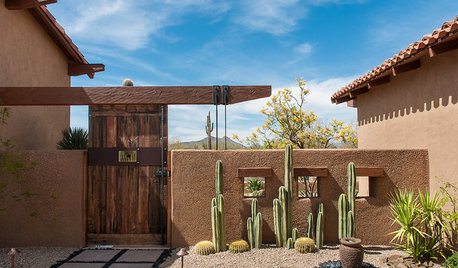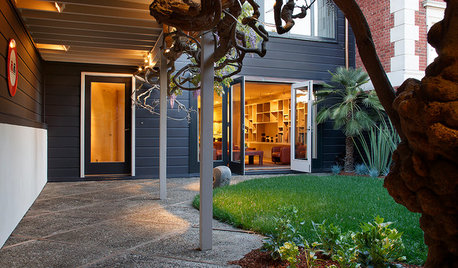Basalt Powder?
mauirose
15 years ago
Related Stories

BATHROOM DESIGNSmall-Bathroom Secret: Free Up Space With a Wall-Mounted Sink
Make a tiny bath or powder room feel more spacious by swapping a clunky vanity for a pared-down basin off the floor
Full Story
BATHROOM DESIGNHow to Choose the Right Bathroom Sink
Learn the differences among eight styles of bathroom sinks, and find the perfect one for your space
Full Story
HOUZZ TOURSHouzz Tour: Luxury and Ruggedness Blend in the Arizona Desert
With Southwest territory style outside and a contemporary look inside, this home offers every comfort in an easygoing way
Full Story
KITCHEN DESIGNAlternatives to Granite Countertops, Part II
Still looking for a new kind of countertop? Try sodalite, zinc, limestone, onyx and more
Full Story
MOST POPULAR9 Elegant Examples of Black in the Bath
Don’t be afraid to embrace the dark side with this powerful hue
Full Story
BUDGET DECORATING8 Cost-Effective Ways to Get a High-End Look
Don’t discount that expensive material yet. By using a small amount in a strategic way, you can get a luxurious look without the expense
Full Story
COLORHow to Add Just the Right Amount of Dramatic Black
Done right, black can add punch and personality to just about any room. Here’s how to go over to the dark side in style
Full Story
COLOR21 Reasons to Decorate With Purple
Whatever shade you choose — lilac, plum, mauve or aubergine — purple makes a statement
Full Story
COLOR4 Cool Paint Colors Touted for 2014 — and How to Use Them
Muted but complex, these hues from Farrow & Ball can stand on their own or play supporting roles
Full Story
HOUZZ TOURSHouzz Tour: Artistically Reimagining a San Francisco Wurster
Sculptures, Calder artworks and creative design bring a 1939 home by William Wurster into modern times
Full StoryMore Discussions







Kimmsr
gardengal48 (PNW Z8/9)
Related Professionals
Ashland Landscape Architects & Landscape Designers · Benbrook Landscape Architects & Landscape Designers · Parole Landscape Architects & Landscape Designers · Rossville Landscape Architects & Landscape Designers · Madera Landscape Contractors · Oviedo Landscape Contractors · Panama City Beach Landscape Contractors · Paterson Landscape Contractors · Adrian Decks, Patios & Outdoor Enclosures · Bonney Lake Decks, Patios & Outdoor Enclosures · Fort Mill Decks, Patios & Outdoor Enclosures · Kyle Decks, Patios & Outdoor Enclosures · New Lenox Decks, Patios & Outdoor Enclosures · Sugar Land Decks, Patios & Outdoor Enclosures · Vandalia Decks, Patios & Outdoor Enclosuresmaifleur01
dchall_san_antonio
mauiroseOriginal Author
takadi
dchall_san_antonio
reg_pnw7